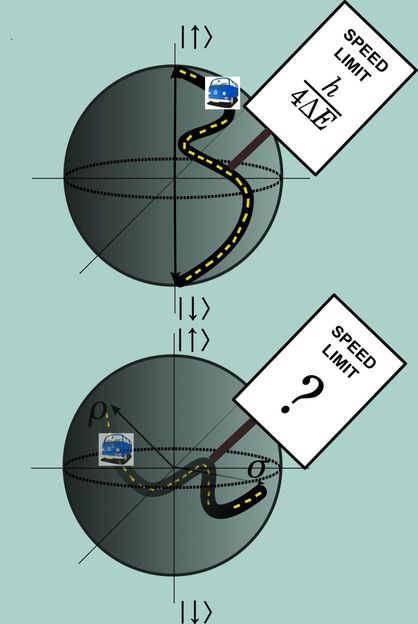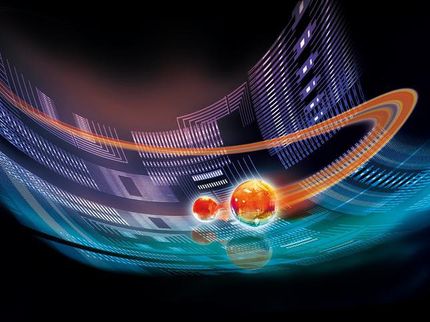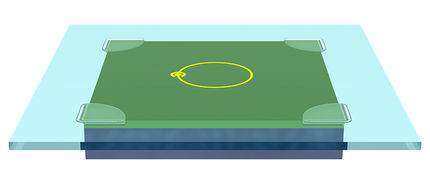Scientists set quantum speed limit
Proof of energy time uncertainty principle puts limits on quantum computing
Advertisement
University of California, Berkeley, scientists have proved a fundamental relationship between energy and time that sets a "quantum speed limit" on processes ranging from quantum computing and tunneling to optical switching.

The speed limit, that is, the minimal time to transition between two easily distinguishable states, such as the north and south poles representing up and down states of a quantum spin (top), is characterized by a well-known relationship. But the speed limit between two states not entirely distinguishable, which correspond to states of arbitrary latitude and longitude whether on or within the sphere of all possible states of a quantum spin (bottom), was unknown until two UC Berkeley chemical physicists calculated it.
Ty Volkoff image, UC Berkeley.
The energy-time uncertainty relationship is the flip side of the Heisenberg uncertainty principle, which sets limits on how precisely you can measure position and speed, and has been the bedrock of quantum mechanics for nearly 100 years. It has become so well-known that it has infected literature and popular culture with the idea that the act of observing affects what we observe.
Not long after German physicist Werner Heisenberg, one of the pioneers of quantum mechanics, proposed his relationship between position and speed, other scientists deduced that energy and time were related in a similar way, implying limits on the speed with which systems can jump from one energy state to another. The most common application of the energy-time uncertainty relationship has been in understanding the decay of excited states of atoms, where the minimum time it takes for an atom to jump to its ground state and emit light is related to the uncertainty of the energy of the excited state.
"This is the first time the energy-time uncertainty principle has been put on a rigorous basis - our arguments don't appeal to experiment, but come directly from the structure of quantum mechanics," said chemical physicist K. Birgitta Whaley, director of the Berkeley Quantum Information and Computation Center and a UC Berkeley professor of chemistry. "Before, the principle was just kind of thrown into the theory of quantum mechanics."
The new derivation of the energy-time uncertainty has application for any measurement involving time, she said, particularly in estimating the speed with which certain quantum processes - such as calculations in a quantum computer - will occur.
"The uncertainty principle really limits how precise your clocks can be," said first author Ty Volkoff, a graduate student who just received his Ph.D. in chemistry from UC Berkeley. "In a quantum computer, it limits how fast you can go from one state to the other, so it puts limits on the clock speed of your computer."
The new proof could even affect recent estimates of the computational power of the universe, which rely on the energy-time uncertainty principle.
Volkoff and Whaley included the derivation of the uncertainty principle in a larger paper devoted to a detailed analysis of distinguishable quantum states that appeared in the Physical Review A.






























































